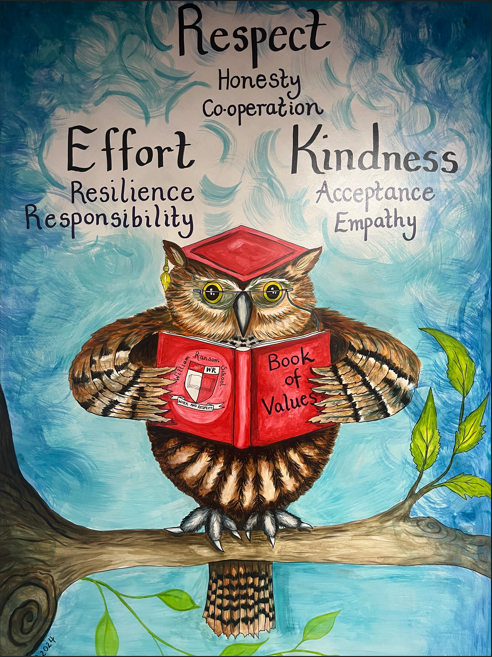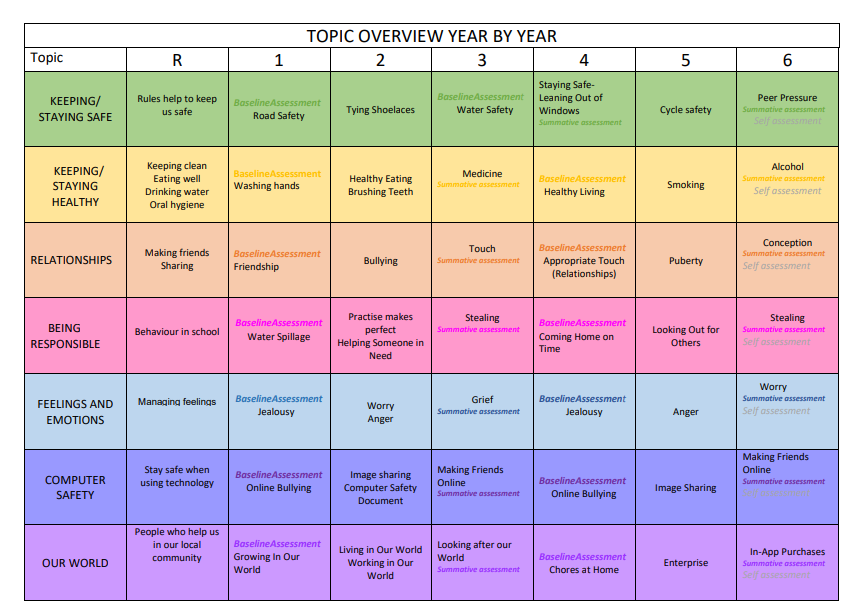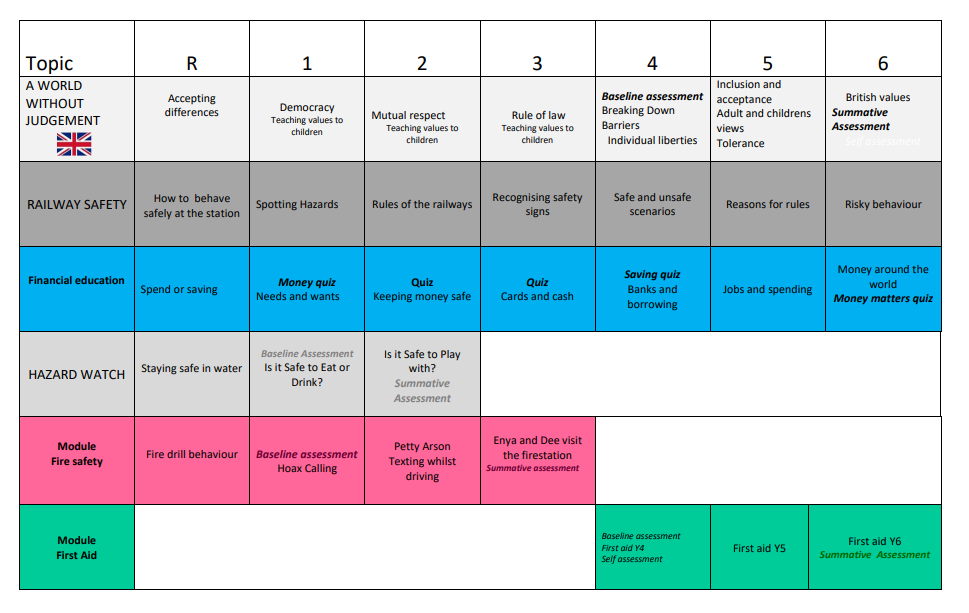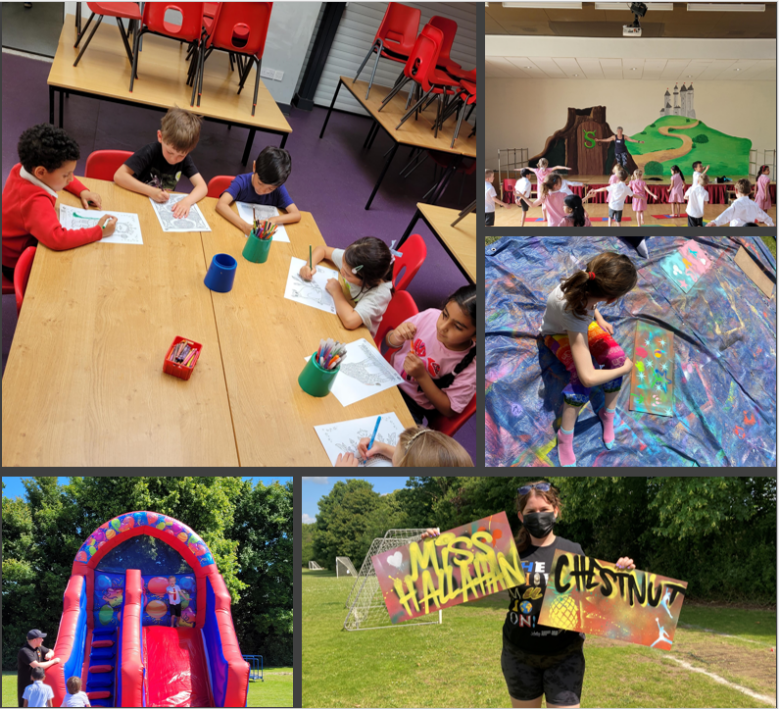PSHE
Intent
At William Ransom Primary School, we believe that a strong PSHE (Personal, Social, Health and Economic) education is important to help our children gain the knowledge, skills and attitudes they need to develop into well-rounded members of society.
Under the guidance issued by the DfE, from September 2020, Relationships Education at primary school is compulsory. At William Ransom, Relationship Education focuses on giving children the knowledge they need to make informed decisions about their wellbeing, health and relationships, to build their self-efficacy. Pupils will be given the vocabulary and support they need to enable them to articulate their feelings. The intention is to promote mental wellbeing and empathy across the whole school and into the community. We want our children to learn about rights and responsibilities and appreciate what it means to be a member of a diverse society in terms of race, religion and relationships.
As a values-based school, we want our children to develop their sense of self-worth by playing a positive role in contributing to school life and the wider community by learning tolerance, treating others equally, fairly and with kindness and mutual respect, and preparing them for their future lives. Our intent is for our children to stay safe, learn to manage risks and make decisions. In an ever-increasing technological world, we also want our children to use online resources safely and know how to get help when they feel unsafe. We want children to understand their feelings about money, financial decisions, careers and the economy.
Implementation
At William Ransom, we use 1 Decision to teach our PSHE lessons. 1 Decision are a Kitemark Assured PSHE provider for schools. Our PSHE curriculum is built on discussion. Lessons build on skills previously learnt and can be timed to match their needs. This sequencing and the unique videos mean that children commit key knowledge to long-term memory. The student self-assessment journeys mean pupils can work towards clearly defined end points. Assessment within 1decision is built into the programme and can be gathered in a number of effective ways; student self-assessment journeys, baseline, formative, and summative assessments.
Our scheme of work is based on the following core themes or 'topics':
- Keeping and staying safe
- Keeping and staying healthy
- Relationships
- Being responsible
- Feelings and emotions
- Computer safety
- Our world
- A world without judgement
- Financial education
- Hazard watch
- Fire safety & First Aid
As our school is situated very close to a railway station, an element of railway safety is included each year.
Teachers will ensure that children’s views are listened to and will encourage them to ask questions and engage in discussion. Teachers will answer questions sensitively, honestly and appropriate to the children’s age.
Children in EYFS develop knowledge, skills and attributes that form a crucial foundation for later teaching of PSHE at KS1. The PSHE curriculum in EYFS is largely covered in the ‘Development Matters Framework’ prime areas of Communication and Language and Personal, Social and Emotional Development covering key concepts and skills around – Making relationships; Self-confidence and self-awareness; Managing feelings and behaviour. Specific areas are also covered such as Physical Development and – Health and self-care and Understanding the World – People and communities, and supports the teaching of Relationships; Health and Wellbeing along with Living in the Wider World. Themes are explored through a range of age-appropriate story books. Children learn to:
- See themselves as a valuable individual.
- Build constructive and respectful relationships.
- Express their feelings and consider the feelings of others.
- Show resilience and perseverance in the face of challenge.
- Identify and moderate their own feelings socially and emotionally.
- Think about the perspectives of others.
- Manage their own needs; including personal hygiene.
- Know and talk about the different factors that support their overall health and wellbeing:
- regular physical activity
- healthy eating
- toothbrushing
- sensible amounts of ‘screen time’
- being a safe pedestrian
- having a good sleep routine
We make connections between learning in PSHE and real life experiences children have encountered. We also make connections with wider aspects of school life e.g. School Values; School Council; Eco Council; Celebration Assemblies and themed activities such as Anti-bullying; Black History; World Book Day; Comic Relief; Sports Relief.
Impact
At William Ransom we are committed to providing our pupils with a safe and nurturing environment that will enable all children to reach their potential, academically, socially, physically and emotionally. Our children are encouraged to be confident, self-motivated, resilient and independent learners and to develop a life-long zest for learning.
Through our PSHE curriculum, we believe that we prepare our children for the next stage in their education as well as preparing them, during this vital stage in their life, for the opportunities, responsibilities and experiences of an adult world. Our curriculum provides our children with a chance to reflect and learn about these crucial elements.
Children will be able to:
- Demonstrate and apply the British Values of Democracy; Tolerance; Mutual Respect; Rule of Law and Liberty.
- Understand the physical aspects involved in RSE at an age appropriate level.
- View themselves positively and be aware of their skills, attributes and achievements.
- Have respect for themselves and others.
- Develop positive and healthy relationships with their peers both now and in the future, including online relationships and understanding their boundaries.
- Understand how to keep healthy both physically and mentally and know how to keep themselves safe physically, mentally and technologically.
- Confidently discuss problems and seek help to solve them.
- Manage risk in their play, friendships, work and online.
- Demonstrate knowledge and understanding of diversity and equality.
- Understand their responsibilities as well as their rights. Promoting fairness.
- Respond positively to change.
- Manage power positively. They will be able to identify forms of bullying and work proactively to deal with these issues.








